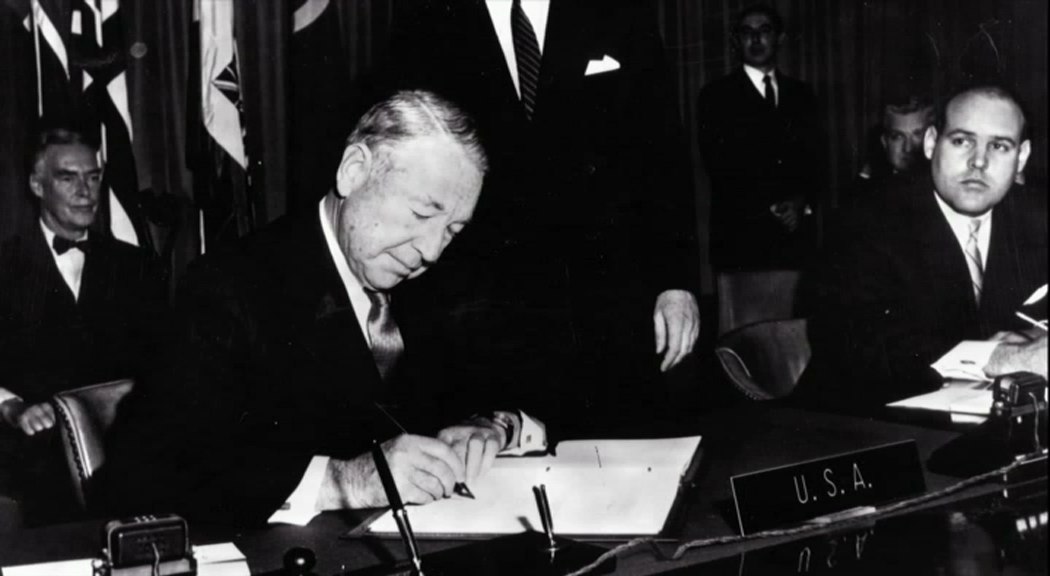Contact Us | 中文简体 | 中文繁體 | English
The Antarctic Treaty

The Antarctic Treaty was signed in Washington on 1 December 1959 by the twelve countries whose scientists had been active in and around Antarctica during the International Geophysical Year (IGY) of 1957-58. It entered into force in 1961 and has since been acceded to by many other nations. The total number of Parties to the Treaty is now 50.
Some important provisions of the Treaty:
Antarctica shall be used for peaceful purposes only
Freedom of scientific investigation in Antarctica and cooperation toward that end … shall continue
Scientific observations and results from Antarctica shall be exchanged and made freely available
Among the signatories of the Treaty were seven countries - Argentina, Australia, Chile, France, New Zealand, Norway and the United Kingdom - with territorial claims , sometimes overlapping. Other countries do not recognize any claims. The US and Russia maintain a “basis of claim”. All positions are explicitly protected in Article IV, which preserves the status quo:
No acts or activities taking place while the present Treaty is in force shall constitute a basis for asserting , supporting or denying a claim to territorial sovereignty in Antarctica or create any rights of sovereignty in Antarctica. No new claim, or enlargement of an existing claim to territorial sovereignty in Antarctica shall be asserted while the present Treaty is in force.
To promote the objectives and ensure the observance of the provisions of the Treaty, "All areas of Antarctica, including all stations, installations and equipment within those areas … shall be open at all times to inspection "
Antarctic Treaty Consultative Meeting XXXII Washington Ministerial Declaration on the Fiftieth Anniversary of the Antarctic Treaty
In the year of the fiftieth anniversary of the signing of the Antarctic Treaty (the “Treaty”) in Washington on December 1, 1959, the Consultative Parties to the Antarctic Treaty,
Recognizing the historic achievements of the Treaty in promoting peace and international cooperation in the Antarctic region over the past half century,
Recognizing that it is in the interest of all humankind that Antarctica continue to be used exclusively for peaceful purposes and shall not become the scene or object of international discord,
Recognizing the integrated and mutually supportive nature of the Antarctic Treaty system,
encompassing, inter alia, the Protocol on Environmental Protection to the Antarctic Treaty, the Convention on the Conservation of Antarctic Marine Living Resources and the Convention for the Conservation of Antarctic Seals, and the central role of the Treaty within that system,
Recalling their commitment to the comprehensive protection of the Antarctic environment and dependent and associated ecosystems, and the designation of Antarctica as a natural reserve, devoted to peace and science,
Mindful that freedom of scientific investigation is and continues to be a cornerstone of the Treaty,
Recalling that this anniversary takes place following the latest International Polar Year, a multidisciplinary scientific endeavor that was supported by all Parties
and endorsed in the 2006 Edinburgh Antarctic Declaration on the International Polar Year,
Acknowledging the key role that Antarctic science plays in understanding the world’s climate system,
Concerned about the implications of global environmental change, in particular climate change, for the Antarctic environment and dependent and associated ecosystems,
Mindful to ensure that human activity in Antarctica, including tourism, is conducted in a manner that effectively promotes the continued protection of the Antarctic environment and minimizes cumulative impacts,
Hereby:
1. Reaffirm their continued commitment to the objectives and purposes of the Antarctic Treaty and the other elements of the Antarctic Treaty system;
2. Reaffirm the importance of the Treaty’s provisions guaranteeing freedom of scientific investigation and reserving Antarctica exclusively for peaceful purposes, free from measures of a military nature;
3. Reaffirm the importance they attach to the contribution made by the Treaty, and by Article IV in particular, to ensuring the continuance of international harmony in Antarctica;
4. Underscore the importance of the Protocol on Environmental Protection to the Antarctic Treaty;
5. Reaffirm their commitment to Article 7 of the Environmental Protocol, which prohibits any activity relating to mineral resources, other than scientific research;
6. Underline the importance of cooperation related to the conservation of living marine resources and strengthened implementation under the Convention on the Conservation of Antarctic Marine Living Resources;
7. Pledge to strengthen their efforts to preserve and protect the Antarctic terrestrial and marine environments;
8. Welcome the increase in Parties to the Antarctic Treaty, from the original twelve signatories in 1959 to forty-seven Parties at the time of this anniversary, and encourage other States that are committed to the objectives of the Antarctic Treaty to accede in accordance with its terms;
9. Encourage Parties to work through other appropriate international organizations that have expertise in respect of certain activities that may also take place in the Antarctic Treaty area, in particular those relating to maritime and aviation activities, to give special consideration to the development, adoption and effective implementation of measures to promote safety and environmental protection in Antarctica;
10. Confirm their intention to work together to better understand changes to the Earth’s climate and to actively seek ways to address the effects of climate and environmental change on the Antarctic environment and dependent and associated ecosystems;
11. Commit to support and build upon the innovative scientific programs relating to Antarctica initiated as part of the International Polar Year 2007-08, and
promote education and outreach programs to enhance global understanding and commitment to protecting the Antarctic environment; and
12. Decide to continue and extend for the benefit of all humankind their cooperation established in the Treaty and in the Treaty system over the last fifty years.
Adopted at Washington, April 6, 2009



